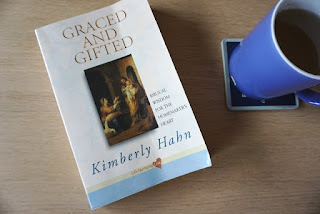I’m
thinking answers to my prayers, dreams and general queries come an average of
two years later. I remember three years ago when I first “became” a
stay-at-home mom I was so panicked with how to organize my time. I remember
talking to my spiritual director about it and him not really understanding my
angst. So it’s good to have books like this one that suggest more practical,
but still prayerful, approaches to organizing your time and your house. I
didn’t like all the parts of the book or find them all useful, but it’s worth
four stars even if just for the first part of the book about priorities. I
loved the use of the “p”s for organizing your priorities and am constantly
thinking about how I should be exercising instead of cleaning/taking kids of kids/etc.
My
favorite quotes:
“We can
learn a lot from other families, provided we avoid comparisons that make us
feel like failures. Perhaps we can incorporate one new idea into our family
life or try one new recipe for a meatless Friday meal. When we share ideas and
recipes with other families, we need to remember that we do not have to do
everything, and we do not want to overwhelm anyone else. We thank God for the
grace to do what we can.” (pg 41)
“He
compared sleep to a little death in which we lose consciousness as we
relinquish our control, and rising the next day to a little resurrection. Our
prayer time reminds us of who God is, who we are and why we are doing what we
are doing.” (pg 66)
“Time
for prayer is like scuba diving in the midst of a storm; it is peaceful below
the storm, if we go deep enough… When things are very difficult, we recall all
that te Lord has already done for us and that he oes not change even though our
circumstances do.” (pg 67)
“I
remind myself daily, There is all the time
I need today to do God’s will today. Prayer is an essential part of that
reminder.” (pg 70)
“In his
bok Appointment With God, Father
Michael Scanlan mentions including at least five minutes of silence to listen
to God, noting any inspirations that come as additional tasks for the day (for
example, speak to this person, write this thank-you note, offer a meal to this
family).” (pg 70)
“A
helpful word picture is a train: The engine represents the facts about God, who
I am in Christ and what is this vocation to which I am called; the cargo car
represents my faith connected to the facts (the engine can run with or without
my faith); and the caboose represents my feelings – nice but unnecessary. Our
feelings of sadness, unresolved relational difficulties, frustration and
depression can derail the train.” (pg 72)
“We are
sabbatarian creatures; we cannot work all seven days a week and still be
healthy people.” (pg 85)
“Not
only do you give this day to the Lord, but he gives it back to you as a day of
relaxation with family and friends.” (pg 86)
“Just as
Friday is the day of preparation for the Jews’ Sabbath, Saturday is our day of
preparation for the Lord’s Day. We think about and prepare for our Sunday meal,
so that we do not have to purchase groceries on Sunday and make store employees
work.” (pg 87)
“We
discover that uncluttered thinking results from uncluttered time and space.”
(pg 88)
“We know
that each day is still going
according to plan; it’s just not necessarily our plan.” (pg 92)
“Each
task becomes a response to the Lord. He
is the one asking me to cook dinner, do laundy, find a Band-Aid, pick up a
tearful baby, sweep up the crumbs. Moving away from self-pity (‘No one notices
all I am doing. I am merely the unpaid maid of the house!’) and toward imitating
Christ’s selfless love, we recall for whom we do each task. A the Franciscan
University rugby team proclaims, ‘We play for an audience of One!’ So do we.”
(pg 108)
“More
than function, beauty in our homes ministers to our souls.” (pg 117)
“One day
she declared that the sanest people in the world were farmers and fishermen.
She believed they did not lose touch with reality because they never lost touch
with the stuff of creation.” (pg 148)
“And the
key to having deep roots, according to the psalmist, is delighting in God’s
Word, reading it and meditating on it.”
“Sometimes
we do not notice how much we rely on our natural virtue and talents to do
things for God. However, if we are not abiding in Christ, our efforts fall
flat.” (pg 157)
“At the end
of Mass, I often prayed with our children that God would reveal to them their
mission in life.” (pg 173)
“To live
by grace means that we admit how weak we are and how much we need his strength
so that we can do these good works.” (pg 199)

No comments:
Post a Comment